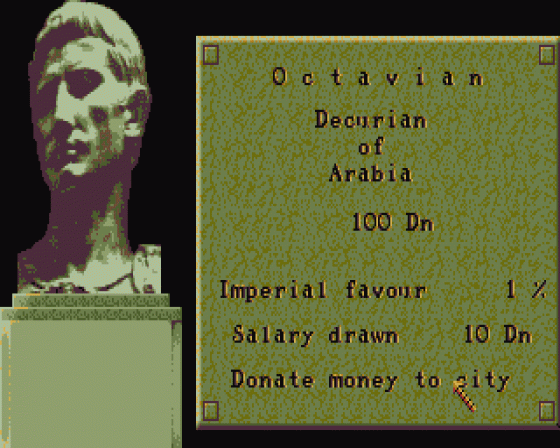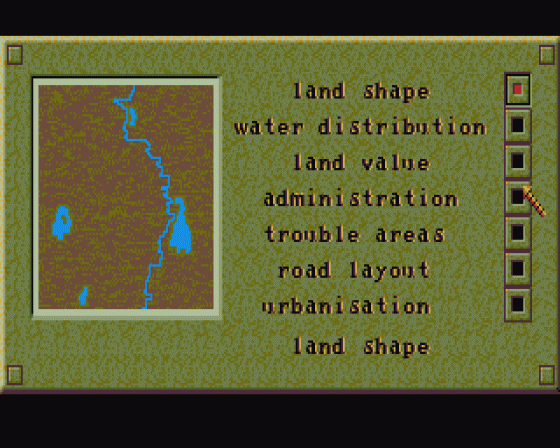
ST Format
 1st February 1993
1st February 1993
Categories: Review: Software
Author: Richard Longhurst
Publisher: Impressions Ltd
Machine: Atari ST
Published in ST Format #42
Caesar
Ah, the joys of ancient Rome. Rampant orgies, tortured slaves, oppressed natives, crucified Christians and corrupt emperors. Richard Longhurst calls that a civilisation
You've got to admit that the game would have looked a bit more of an attractive proposition if it has been called Caligula. But this is strictly an orgy-free zone, don't even think about bringing your horse, and you probably won't even need the grapes. We are talking serious empire building here.
Caesar is pretty much like the great grand-daddy of construction games, Sim City. You start with an empty plot of land, a mountain of money (or a modest pile if you play on the hardest difficulty setting) and the ability to pluck buildings out of thin air and plop them down on the ground. Your performance is measured against four criteria: the peace your people have enjoyed, the level of culture in the city, the prosperity of the people, and the extent of your empire within the province. Do well enough and you're promoted up the ranks of the Roman political system, and it's on to conquer a new province.
Build Build Build

The main aim of the game is to place buildings and produce a throbbing little metropolis to rival that of Rome itself. A wide variety of buildings can be plucked from thin air, but there's a price to be paid, because every building you place saps away at your money. A lump sum is payable when you create the building: anything from a few dinar for a house or temple, through 50 or so for a decent workshop, right the way up to the top of the scale and the hippodrome, which costs a whopping 300 dinar. All the buildings cost a certain amount to maintain, so your resources soon dwindle away.
But there's no point plucking and placing at random, there has to be method to your madness. First of all you need an administrative centre to collect taxes, you may even meed several of them to ensure there's plenty of red tape. You need houses for people to live in, all of which have to be near a road and water supply, and so you have to build the town's infrastructure. Then you need lots of places for people to work (unless, of course, you'd rather be creating a Conservative vision of Britain), places for them to learn, places for them to go when they're poorly, places for them to enjoy themselves and places for them to pray, as well as barracks for soldiers to live in.
While you're building your provincial level map shows the entire province and it's here that you can do some more plucking and plonk down some forts and roads to connect the villages.
Slave Management

Being in the Roman army is not an attractive proposition when there are hordes of barbarians marauding around the countryside, so you have to jack up the wages and the conscription level to get some poor suckers to serve for you. It's best to get four or five strong cohorts early on because those barbarians are nasty little fellows, and if they make it into the city they can wreck loads of buildings and can only be stopped if one of the militia men happens to run into him.
The presence of barbarians is both a strong and weak point. The good side, if you're an Impressions fan, is that when a cohort meets a horde, you have the option of switching to the Impressions' Cohort war game to play out the battle in detail. But for the rest of us, the chance encounters just mean clicking a couple of buttons, which gets very tedious very quickly, particularly when the hordes are so numerous and your troops are so strong that you win every time anyway.
Busy Doing Nothing
And to make matters worse, after each battle, the cohorts stand around waiting for new patrol orders, so it's quite possible for another horde to sneak into the city while you do even more clicking in a frantic effort to tell the cohort where to go. Another problem with the barbarians is that early on it's quite likely that they'll get into the city, which drastically reduces your peace rating, so towards the end of a level, when prosperity, culture and empire are pushing 100%, you're waiting around for the prosperity rating to creep up. It moves at around 4% a year, which means there's a lot of waiting to be done when the target is 80% minimum on each rating.
Get Exploring!

But despite these irritating niggles, Caesar is a thoroughly enjoyable game to play. There are lots of factors to keep an eye on, and the manual is vague enough to leave you having to do a lot of exploration and experimentation to find the best way to achieve your objectives. Whether this is intentional is unclear because at first the game doesn't seem to gel together very well. There seems little point in plonking buildings down only for barbarians to come and wreck them, but there's a gradual learning process as you learn to balance attending to the needs at the city level - providing slaves, water, roads, jobs and entertainment - and checking the provincial level to make sure you've got all the bases covered with regards to barbarian invasion.
Verdict
When you've achieved the set objectives regarding peace, culture, prosperity and empire in a province, you're duly promoted and sent to a tougher province, which has more barbarians and tougher targets. But even after four or five promotions, it's easy to develop a technique to get 100%
ratings in all factors, so it's not too tough to make the grade for the next promotion. For example, to get the 100%
on the empire rating, all you need to do is plonk down five or six forts and lay roads from the main city to the villages. In fact, it can get a bit tedious having to go through the same city-building process each time you're promoted. But whereas in Sim City there was nothing to do when your city was complete, apart from throw in an earthquake or another disaster, the prospect of promotion gives you the incentive to strive for improvement.
Who Needs Promotion?
If you become particularly attached to a city (It's pretty unlikely, but it might happen) you can decline the promotion and carry on building your city up, and amassing an enormous personal fortune to boot. The only trouble is, they stop paying you when you've piled up 9,999 dinar, but you can take the money with you when you're promoted to help out if the next city gets a bit strapped for cash.
Caesar is an excellent game. Parts of it don't quite hand together well enough and there's not really enough variety from one province to the next, and ultimately it's a bit easy to suss out how to win, but even so, it's very absorbing and extremely addictive. All told, it's a bit of a cracker.








